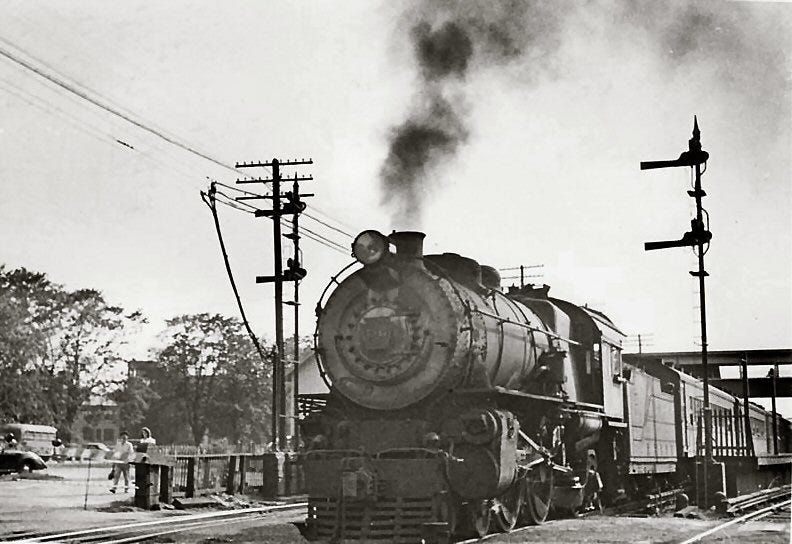Transportation: Rail
MAY CASTLE met Lorna’s train at the Babbington station. It was the last week of January. Snow was falling in fat, wet, heavy clumps. On the ground, the flakes turned to slush.
Herb ’n’ Lorna, Chapter 15

May and Lorna greeted each other quickly, hugged briefly on the platform, and then rushed across the parking lot to May’s Chrysler, threw Lorna’s luggage onto the back seat, and climbed in.
Herb ’n’ Lorna, Chapter 15

Emotions: Hopelessness, Despair
Hope versus Despair
“Nothing makes it any easier any more. I used to love a nice night, a clear night, with stars. The stars used to make me happy, but now — oh, now nothing makes me happy. Everything seems so miserable. Everything seems so hopeless.”
“May!” said Lorna. “Is that the way you feel? Does everything seem hopeless to you?”
“Well, yes,” said May. “I think it does. It was different when I was younger, at least it was different for me when I was younger. I think I thought I was going to live forever. No. That’s not it. I never thought about it at all — dying, I mean. Now, well, now dying is all anyone talks about. It’s all I think about. I look at myself in the mirror in the morning, and I think to myself, You’re dying, May. This dying woman you see in your mirror is you. Doesn’t that seem hopeless?”
“It sounds as if you’re upset about growing old, May, not about dying.”
“Well. Maybe. Maybe I am. I don’t know which is worse,” said May. “You either die or grow old — or both. It’s hopeless.”Herb ’n’ Lorna, Chapter 15
Is despair wrong? Isn’t it the natural condition of life after a certain age? . . . After a certain number of events, what is there left but repetition and diminishment? Who wants to go on living? The eccentric, the religious, the artistic (sometimes); those with a false sense of their own worth. . . .
Some people, as they grow older, seem to become more convinced of their own significance. Others become less convinced. Is there any point to me? Isn’t my ordinary life summed up, enclosed, made pointless by someone else’s slightly less ordinary life? . . . life, in this respect, is a bit like reading . . . if all your responses to a book have already been duplicated and expanded upon by a professional critic, then what point is there to your reading? Only that it’s yours. Similarly, why live your life? Because it’s yours. . . .Geoffrey Braithwaite in Julian Barnes’s Flaubert’s Parrot
“Hope, you see, Wal’r,” said the captain, sagely, “Hope. It’s that as animates you. Hope is a buoy, for which you overhaul your Little Warbler, sentimental diwision, but Lord, my lad, like any other buoy, it only floats; it can’t be steered nowhere. Along with the figure-head of Hope,” said the Captain, “there’s a anchor; but what’s the good of my having a anchor, if I can’t find no bottom to let it go in.”
Charles Dickens, Dombey and Son, Chapter 50, “Mr. Toots’s Complaint”
See also: Hopes and Fears TG 63; Hope versus Despair (or Fear) TG 109
Have you missed an episode or two or several?
You can begin reading at the beginning or you can catch up by visiting the archive or consulting the index to the Topical Guide.
You can listen to the episodes on the Personal History podcast. Begin at the beginning or scroll through the episodes to find what you’ve missed.
You can ensure that you never miss a future issue by getting a free subscription. (You can help support the work by choosing a paid subscription instead.)
At Apple Books you can download free eBooks of “My Mother Takes a Tumble,” “Do Clams Bite?,” “Life on the Bolotomy,” “The Static of the Spheres,” “The Fox and the Clam,” “The Girl with the White Fur Muff,” “Take the Long Way Home,” “Call Me Larry,” and “The Young Tars,” the nine novellas in Little Follies, and Little Follies itself, which will give you all the novellas in one handy package.
You’ll find overviews of the entire work in An Introduction to The Personal History, Adventures, Experiences & Observations of Peter Leroy (a pdf document) and at Encyclopedia.com.


